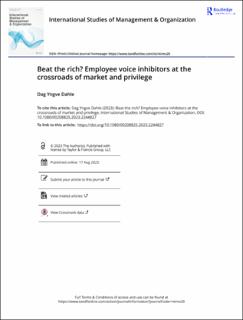| dc.contributor.author | Dahle, Dag Yngve | |
| dc.date.accessioned | 2023-09-05T12:08:40Z | |
| dc.date.available | 2023-09-05T12:08:40Z | |
| dc.date.created | 2023-08-18T08:58:10Z | |
| dc.date.issued | 2023 | |
| dc.identifier.citation | International Studies of Management & Organization. 2023, 53 (3), 167–190. | en_US |
| dc.identifier.issn | 0020-8825 | |
| dc.identifier.uri | https://hdl.handle.net/11250/3087502 | |
| dc.description.abstract | Control-oriented HRM, performance appraisal dissatisfaction, and reputation concern are found to have a "muzzling effect" on teachers, partly through leader-member exchange. Does this effect vary with the level of (a) marketization, and (b) school popularity and privilege? These questions are examined using survey data from Norwegian upper secondary school teachers (N ¼ 1055), and analyzed with path analysis and bootstrapping. Results support some, but not all, hypotheses. Analyses show that the inhibiting effects of performance appraisal dissatisfaction and reputation concern on employee voice are stronger in the highly marketized school field of Oslo than in schools in other areas, and vary with marketization level. The inhibiting effect of reputation concern on voice is stronger in privileged than in marginalized schools and varies with the level of privilege. No such patterns for the inhibiting effects of control-oriented HRM and PA dissatisfaction are found. The findings indicate that reputation management theory takes center stage, as voice is regarded as a reputation management tool. Institutional logics are too found to be crucial when understanding the results. Implications are tied to reputation concerns , leading to a stronger muzzling effect on teachers in marketized areas than elsewhere, and in privileged schools as compared to marginal-ized schools. This calls for caution with regard to differing marketization and privilege levels in school settings. | en_US |
| dc.language.iso | eng | en_US |
| dc.publisher | Taylor & Francis | en_US |
| dc.rights | Navngivelse 4.0 Internasjonal | * |
| dc.rights.uri | http://creativecommons.org/licenses/by/4.0/deed.no | * |
| dc.subject | HRM | en_US |
| dc.subject | LMX | en_US |
| dc.subject | performanceappraisal | en_US |
| dc.subject | reputationmanagement | en_US |
| dc.subject | voice | en_US |
| dc.title | Beat the rich? Employee voice inhibitors at the crossroads of market and privilege | en_US |
| dc.type | Peer reviewed | en_US |
| dc.type | Journal article | en_US |
| dc.description.version | publishedVersion | en_US |
| dc.rights.holder | © 2023 The Author(s). | en_US |
| dc.subject.nsi | VDP::Samfunnsvitenskap: 200 | en_US |
| dc.source.pagenumber | 167-190 | en_US |
| dc.source.volume | 53 | en_US |
| dc.source.journal | International Studies of Management and Organization | en_US |
| dc.source.issue | 3 | en_US |
| dc.identifier.doi | 10.1080/00208825.2023.2244827 | |
| dc.identifier.cristin | 2167829 | |
| cristin.ispublished | true | |
| cristin.fulltext | original | |
| cristin.qualitycode | 1 | |

